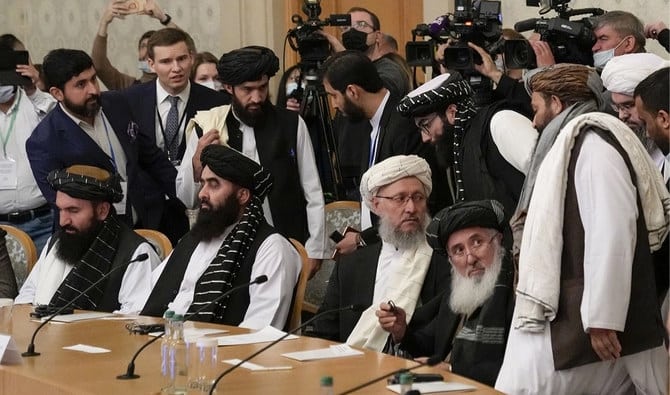The Taliban boycotted a United Nations-sponsored conference on Afghanistan, the first time the extremist group was invited to participate in a major international event since it seized power in 2021.
The group’s refusal to attend the February 18-19 conference in Qatar is seen as a blow to the hopes of the international community to improve dialogue with the Taliban government, which remains unrecognized and is under sanctions.
The two-day event brought together representatives of member states, special envoys to Afghanistan, and Afghan civil society members, including women.
The conference came amid a standoff between the Taliban and the international community. Since regaining power, the hard-line Islamists have monopolized power, committed gross human rights abuses, and severely curtailed the freedoms of Afghan women.
The international community has called on the Taliban to reverse its repressive policies and create an inclusive government, which the extremist group has refused.
“One of our main objectives is to overcome this deadlock,” UN Secretary-General Antonio Guterres said on February 19, adding that “the concerns of the international community” and “the concerns of the de facto authorities of Afghanistan” both need to be taken into account.
While the world body has left the door open for the Taliban to participate in future UN-sponsored meetings, observers said it is unclear if the Taliban and the international community can increase engagement and bridge their differences.
‘Unacceptable’
The Taliban set conditions for its participation in the Doha conference, including that it be the sole representative of Afghanistan at the meeting. The UN chief said the group’s demands were “unacceptable” and amounted to recognizing the Taliban as the country’s legitimate government.
The Taliban has also opposed the appointment of a UN special envoy to Afghanistan, one of the key issues discussed at the Doha meeting. One of the envoy’s main tasks would be to promote intra-Afghan dialogue.
The Taliban’s Foreign Ministry, in a statement issued ahead of the meeting, accused the international community of “unilateral impositions, accusations, and pressurization.”
Javid Ahmad, a senior fellow at the Atlantic Council think tank in Washington, said the group wants to engage with the international community on “Taliban-owned terms without having to entertain negotiations that could challenge their grip on power.”
Ahmad said the Taliban was keen to avoid being “pigeonholed by the engagement community into unwanted conference outcomes without prior discussions, which would undermine their authority as rulers.”
That, experts said, would explain the Taliban’s opposition to the appointment of a UN special envoy for Afghanistan, an international interlocutor who would be tasked with promoting dialogue between the extremist group and exiled opposition political figures.
Since seizing power, the Taliban has sidelined many ethnic and political groups as well as women. The Taliban’s theocratic government appears to have little support among Afghans.
“Problems will persist as long as these issues are not addressed,” Ali Ahmed Jalali, a distinguished professor at the National Defense University in Washington, told RFE/RL’s Radio Azadi. “The appointment of the UN special envoy will mean that the Taliban government is downgraded from a government to a group.”
‘Categorical Answer’
Most of the international community’s dialogue with the Taliban has been through its ministers in Kabul and its diplomats in Qatar, where the group maintains a political office.
But experts said the Taliban’s spiritual leader, Mullah Haibatullah Akhundzada, and his key confidants, all of whom are senior clerics, have the real decision-making authority in the group.
The reclusive Akhundzada, a hard-line cleric who rarely leaves the southern Afghan city of Kandahar, has the ultimate say on all important matters under the Taliban’s clerical system.
“The Taliban diplomats will keep the door open,” said Anders Fange, a Swedish aid worker who worked for the UN in Afghanistan. “But the people down in Kandahar will give you a more categorical answer.”
Fange said international pressure on the Taliban is unlikely to work given the fundamentalist views of its leadership.
“The Taliban sees itself as only answerable to Allah and not the people of Afghanistan and even less to the international community,” he added.
International Divisions
One of the key aims of the Doha conference was to reach a consensus among member states on how to deal with the Taliban. But that has been complicated by Afghanistan’s neighbors, as well as Russia and China, who have forged ties with the Taliban.
At the Taliban’s request, the Russian delegation that participated in the Doha meeting refused to meet the Afghan civil society representatives.
China’s special envoy to Afghanistan, who was in Doha, meanwhile called on Washington to unfreeze some $7 billion in Afghan central bank reserves held in the United States, a move that Beijing has said will allow the Taliban to address the devastating humanitarian and economic crises in Afghanistan.
If the West does not engage with the Taliban, it risks “being entirely without influence” in Afghanistan, said Fange.













